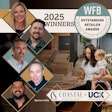
 VoodooDot
VoodooDot
Steve owns a successful hardwood flooring retail company that has been in business for 10 years and been profitable from the first month. During the Great Recession, he was awash in applications. Every salesperson seemed to want to work for his company, and he could afford to take hiring risks. But not now. Today, he is lucky to get 10 responses to his classified ads.
It's a tough situation. If he hires wrong, he risks losing months of business, benefits, training costs and salary, possibly a wrongful termination or EEOC lawsuit. If he succeeds, he could outsell his competitors. Every hiring decision must be made from Steve's best estimate of future success; it can't be a guess or a gut feeling. But how can Steve pick a winner from an interview alone? How can you choose the right sales candidates for your own retail store? By avoiding these four hiring traps.
Trap 1: Their Interview Skill
How much of the hiring decision should be based on how well a candidate interviews? Take a guess—80 percent, 90 percent? Would you believe 2 percent?
According to a University of Michigan study, good face-to-face or even telephone interviewing skills increases the chance a candidate is a winner by only about 2 percent. This is because most candidates are more experienced at interviewing than you are because of the sheer numbers of interviews they participate in. The ironic thing? The worse the candidate, the more practice they may get at interviewing.
I interview people on the phone, and if they sound like they can put a few sentences together without major mistakes, I will see them face-to-face. I am tempted to hire if they seem enthusiastic and act experienced in the areas I want them to perform. But I won't, and you shouldn't, either. Instead, put together written questions ahead of time, write the correct answers and weight the questions by importance from 1–10. Write the candidate's answers down and score them on a 1–10 scale based on your answers. After the interview, multiply the weight by the numerical value of the answer. The top scorer wins that round.
Trap 2: Personality
How much importance do you put on a good personality? Do you try to hire those who are energetic and act like they will break down brick walls to get the job done? Most of us do, but according to many industrial psychologists, personality isn't significant in determining the success of sales applicants.
Over the years, personality tests like the Myers-Briggs index have been employed to predict how candidates will behave. If the person is a "Driver," for example, they are likely to be hard-charging in most situations and often demand "my way or the highway." When pressed, many of these hiring experts admit this type of testing is not useful in predicting sales success. But it is useful in training communication skills and self-awareness. I once heard that "neurotics build sandcastles in the sky, psychotics move into them and psychologists collect the rent."
What is important is how the applicant adapts to different personalities. If you are a high-energy person and the candidate is, too, ask someone in your company with opposite characteristics to interview the candidate. I usually ask my administrative assistant, who is fairly rigid, to talk to applicants. (Sometimes even I can't get along with her!) I joke that I immediately dismiss whomever she likes. If she and I both like a candidate, my attention is piqued. It shows the applicant has the flexibility to adapt to many personalities and communication styles.
Trap 3: Bad References
Did you call the applicant's last two employers? Did you ask if they would hire your candidate back if they had the chance? But your interviewee can succeed with you even when they failed with past employers, right? I will answer this question with another question. Do you think people can change their behavior with enough motivation? Or do you think that even if we could change, we aren't very likely to do so?
People don't change. You are the same today as you were 10 years ago except for the clothes you wear and the style of your hair. The recidivism rate for prison is 68 percent after three years. I wouldn't want to go back to prison, would you? Do you think the divorce rate is higher for second marriages or lower? You guessed it, it's higher. There is enormous motivation to stay married a second time, especially after the heartbreak and financial disaster of divorce. You would think that would be enough motivation to fix whatever happened to end the first marriage, wouldn't you? Well, if we can't change our relationship skills, we surely will have a lot of trouble changing job skills, as well.
Tell past employers what you want the applicant to do and let the past boss give you his or her assessment. They know your candidate better than you do. If you don't get a rousing yes, you may be taking a risk you can't afford. Good people get stuck in bad jobs, but winners find ways to succeed no matter where you put them.
Trap 4: Not Using a Model Employee
Who has previously performed well at the job you are selecting for? Write down between six and eight characteristics and duties a past winner had. Now look for them. If you don't know what you are looking for, you won't get it.
Keep At It
Most managers interview over and over and dread the process. But you should always be looking. As winners get harder to find, you need to stay on the lookout for those from other companies who fit your model. You can grow a person from scratch from another industry or pay more for someone who has proven success within their existing company. It depends on how good your training is and how much you can pay. But judging personality and sales skills will be easier now that you know how to avoid bad hires.

































